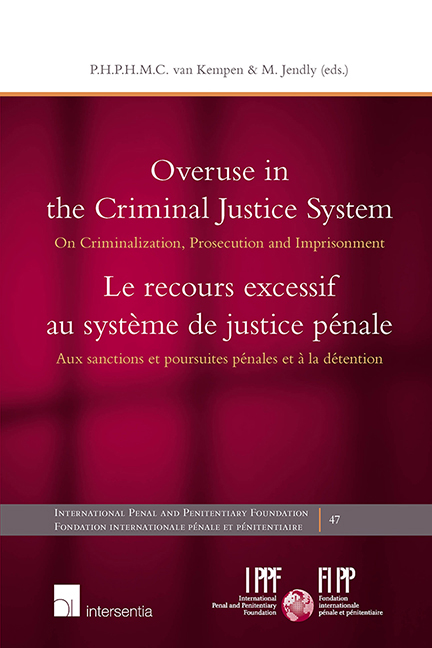Book contents
- Frontmatter
- Dedication
- Contents
- Acknowledgements
- Remerciements
- PART I INTRODUCTORY SYNTHESIS AND ANALYSES 1ÈRE PARTIE. SYNTHÈSE ET ANALYSES INTRODUCTIVES
- PART II THEMES 2ÈME PARTIE. THÈMES
- PART III NATIONAL REPORTS 3ÈME PARTIE. RAPPORTS NATIONAUX
- Overuse in the Criminal Justice System in Argentina
- Le recours au système de justice pénale en Belgique: état des lieux et perspectives
- Overuse of Criminal Law in Finland
- Overuse in the Criminal Justice System in Germany
- Overuse in the Criminal Justice System in Greece
- Overusing the Criminal Justice System: the Case of Ireland
- Overuse in the Criminal Justice System in Japan
- Tendencies of Overuse in Criminal Law Policy and Criminal Law Enforcement in the Netherlands
- Overuse in the Criminal Justice System in New Zealand
- Overuse in the Criminal Justice System in Nigeria
- Overuse in the Criminal Justice System in Poland
- Overuse in the Russian Criminal Justice System
- Overuse in the Criminal Justice System in Spain
- Recourt-on de manière excessive au système pénal en Suisse?
- Overuse of the Criminal Justice System in Taiwan
- Overuse and Underuse of the United States Criminal Justice System in the Area of Business Crimes
- The International Penal and Penitentiary Foundation: history and purpose
- La Fondation internationale pénale et pénitentiaire: histoire et objectif
- The IPPF Series
Overuse in the Criminal Justice System in Poland
from PART III - NATIONAL REPORTS 3ÈME PARTIE. RAPPORTS NATIONAUX
Published online by Cambridge University Press: 26 June 2019
- Frontmatter
- Dedication
- Contents
- Acknowledgements
- Remerciements
- PART I INTRODUCTORY SYNTHESIS AND ANALYSES 1ÈRE PARTIE. SYNTHÈSE ET ANALYSES INTRODUCTIVES
- PART II THEMES 2ÈME PARTIE. THÈMES
- PART III NATIONAL REPORTS 3ÈME PARTIE. RAPPORTS NATIONAUX
- Overuse in the Criminal Justice System in Argentina
- Le recours au système de justice pénale en Belgique: état des lieux et perspectives
- Overuse of Criminal Law in Finland
- Overuse in the Criminal Justice System in Germany
- Overuse in the Criminal Justice System in Greece
- Overusing the Criminal Justice System: the Case of Ireland
- Overuse in the Criminal Justice System in Japan
- Tendencies of Overuse in Criminal Law Policy and Criminal Law Enforcement in the Netherlands
- Overuse in the Criminal Justice System in New Zealand
- Overuse in the Criminal Justice System in Nigeria
- Overuse in the Criminal Justice System in Poland
- Overuse in the Russian Criminal Justice System
- Overuse in the Criminal Justice System in Spain
- Recourt-on de manière excessive au système pénal en Suisse?
- Overuse of the Criminal Justice System in Taiwan
- Overuse and Underuse of the United States Criminal Justice System in the Area of Business Crimes
- The International Penal and Penitentiary Foundation: history and purpose
- La Fondation internationale pénale et pénitentiaire: histoire et objectif
- The IPPF Series
Summary
INTRODUCTION
In Poland criminal acts are classified as criminal offences (“przestępstwa”) and petty or administrative offences (“wykroczenia”). A criminal offence can take the form of felonies (zbrodnie) of misdemeanors (występki). Felonies are criminal acts that can be committed only intentionally and are subject to the penalty of at least three years of deprivation of liberty. Misdemeanors may also be committed unintentionally if the law so provides. Misdemeanors include fiscal offences. Criminal offences are regulated in the Criminal Code of 1997 (Journal of Laws 1997, No. 88, item 553, with amendments; thereafter referred to as “the CC”). The basic act regulating petty or administrative offences is the Petty Offences Code of 1971 (consolidated text: Journal of Laws 2015, item 1094 with amendments; thereafter referred to as “the POC”). Fiscal offences and petty fiscal offences are regulated in the Fiscal Penal Code of 1999 (consolidated text: Journal of Laws 2013, item 186 with amendments). Although the three codes are the basic acts for criminal justice, many criminal offences and petty or administrative offences are provided for in various statutes regulating may aspects of living in society. The number of criminal offences regulated out of the Criminal Code and Fiscal Penal Code is much higher than offences provided for in both codes. For example, more than 300 various types of offences against business transactions and economic turnover are defined in almost 60 statutes regulating economic turnover in Poland.
This chapter does not concern petty and administrative offences. Although they are criminal acts, they do not constitute crimes. The most severe penalty that may be imposed for petty or administrative offences is the arrest (areszt), which means deprivation of liberty for a period not less than 5 days but not exceeding 30 days. Other sanctions are: limitation of liberty, a fine and a reprimand. Persons convicted for petty or administrative offences are not registered in the National Crime Register except for those sentenced to the penalty of arrest.
Some criminal acts directed against property may be classified as criminal offences or petty offences. It depends on the value of property being subject of a given offence.
- Type
- Chapter
- Information
- Overuse in the Criminal Justice SystemOn Criminalization, Prosecution and Imprisonment, pp. 509 - 528Publisher: IntersentiaPrint publication year: 2019

